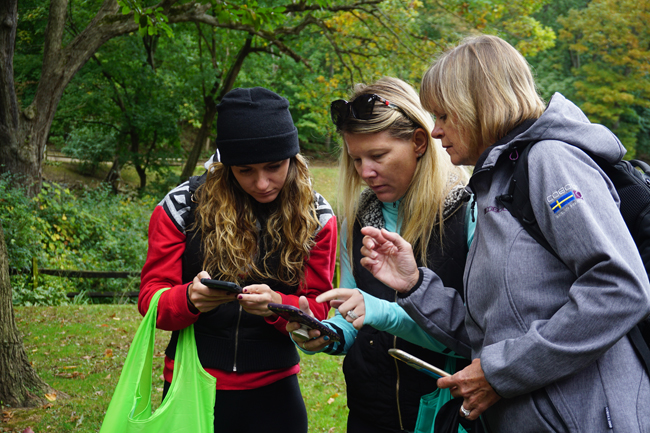
Teachers explored using mobile apps for education on the field at the 2019 Mentor Teacher Program in Sands Point Preserve. Credit: Jimena Perez-Viscasillas, NYSG/LISS.
The Long Island Sound Mentor Teacher Program is accepting 2022 applications from 5th—12th-grade educators interested in leading workshops
Contacts:
Jimena B. Perez-Viscasillas, Long Island Sound Study NY Outreach Coordinator, New York Sea Grant, jbp255@cornell.edu
Lillit Genovesi, Long Island Sound Study NYC and Western Basin Outreach Coordinator, New York Sea Grant, lg543@cornell.edu
Stony Brook and Queens, NY, March 7, 2022 — On a chilly October morning in 2019, teachers Amy Olander and Veronica Morabito-Weeks excitedly set up oyster tanks and put model-making materials like aluminum trays and sponges over tables at the Cedar Beach Nature Center in Mount Sinai. They were getting ready to host their very first Mentor Teacher Workshop on nitrogen pollution, where they would later share with fellow teachers some of the interactive activities, games, and lessons they used in their own classrooms to teach their students about Long Island Sound. The weekend after that, educators Hildur Palsdottir and Leah Master held their workshop on plot studies at the Sands Point Nature Preserve, where they led fellow teachers on a walking tour of the grounds, tested the sand for microplastics, and tried out different kinds of portable microscopes together. These fun workshops would be the last of their kind in a while for the Long Island Sound (LIS) Mentor Teacher Program, which like many other programs for educators like this had to take a hiatus during the height of the coronavirus pandemic in 2020 and 2021.
This year, the LIS Mentor Teacher Program is back and accepting applications from 5th- to 12th-grade educators interested in leading workshops for 2022! — see our "Call for Mentor Teachers" (pdf)
Hosted by New York Sea Grant and the Long Island Sound Study national estuary program, the LIS Mentor Teacher Program provides technical and financial support to selected pairs of teachers to organize professional development workshops for their peers. The hands-on interdisciplinary workshops include a field component and center around Long Island Sound topics, with past workshops covering geology, water quality, marine debris, and more.
The 2022 LIS Mentor Teacher Program is encouraging topics centered around climate change adaptations, sea-level rise, and ecological health. Three pairs of educators will be selected to conduct one workshop per team and will be given a $1,200 stipend per teacher, a travel budget, and a workshop budget to cover materials, location, etc. New York teachers in Queens, the Bronx, Westchester, and on Long Island are encouraged to apply!
Teachers across New York can look forward to joining these workshops once they are scheduled for the Fall. Ultimately, the lessons, activities, and programs shared during these workshops, and on the Long Island Sound Study website, will help inspire students throughout the region to explore, understand, and take care of the amazing resources Long Island Sound has to offer.
For more information on the LIS Mentor Teacher Program, contact Outreach Coordinators Jimena Perez-Viscasillas (jbp255@cornell.edu) and Lillit Genovesi (lg543@cornell.edu), or visit longislandsoundstudy.net
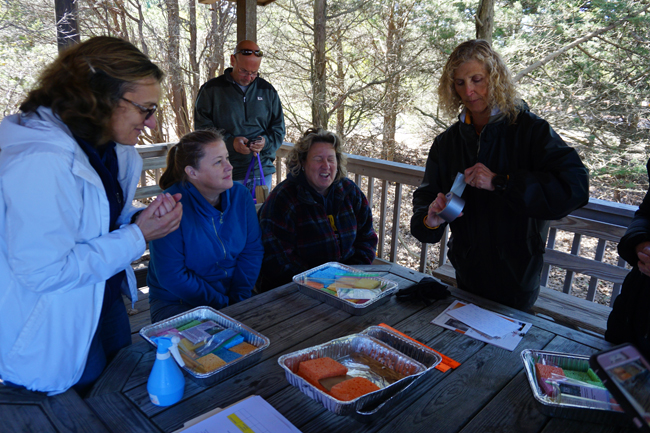
2019 Mentor teachers Veronica Morabito-Weeks (far right) and Amy Olander (far left) lead an exercise on how to make models to demonstrate the effects of rain on permeable vs impervious surfaces. Credit: Jimena Perez-Viscasillas, NYSG/LISS.
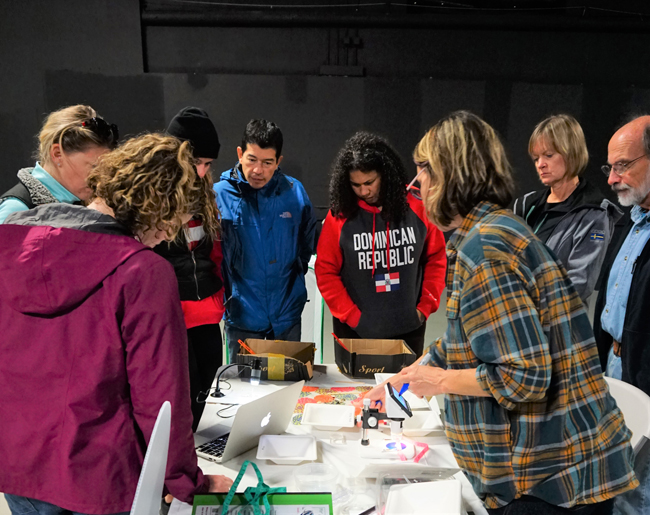
Teachers huddle around a table to view microplastics through different kinds of portable microscopes at the 2019 LIS Mentor Teacher Workshop led by Leah Master (left, in pink) and Hildur Palsdottir (right, in plaid). Credit: Jimena Perez-Viscasillas, NYSG/LISS.
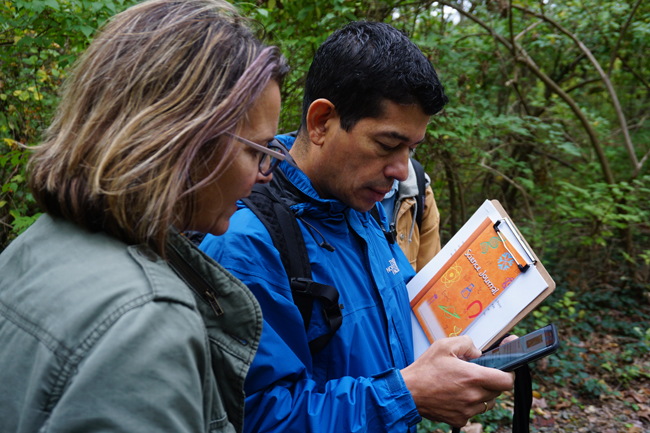
2019 Mentor Teacher and fellow educator explore apps as tools for teaching on the field. Credit: Jimena Perez-Viscasillas, NYSG/LISS.
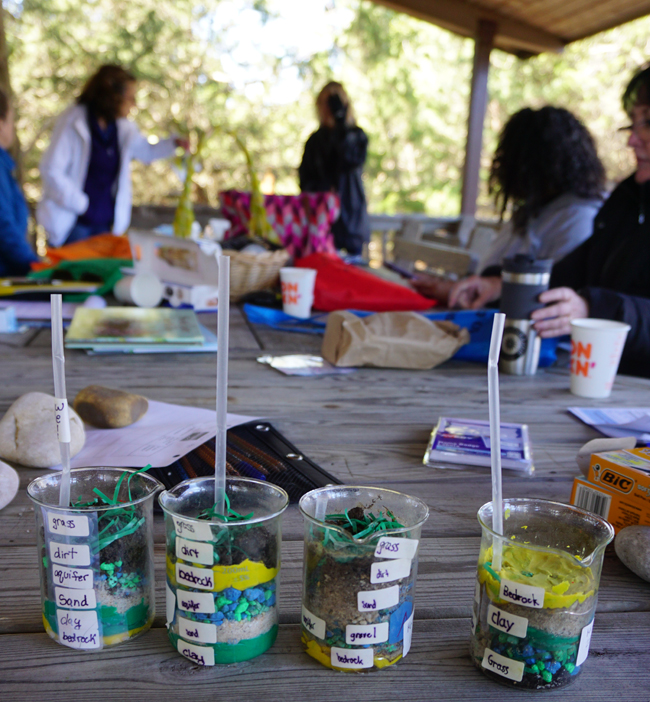
Models built by teachers at the 2019 Mentor Teacher program at Cedar Beach focused on nitrogen pollution. Credit: Jimena Perez-Viscasillas, NYSG/LISS.
More Info: Long Island Sound Study
Long Island Sound is one of the 28 nationally designated estuaries under the National Estuary Program (NEP), which was established by Congress in 1987 to improve the quality of Long Island Sound and other places where rivers meet the sea.
The Long Island Sound Study is a cooperative effort sponsored by the Environmental Protection Agency and the states of Connecticut and New York to restore and protect the Sound and its ecosystems. The restoration work is guided by a Comprehensive Conservation and Management Plan under four themes: Clean Waters and Healthy Watersheds; Thriving Habitats and Abundant Wildlife; Sustainable and Resilient Communities; and Sound Science and Management.
For more on what you can do to make a difference, click over to the "Get Involved" or "Stewardship" sections of the Long Island Sound Study's website. News on the Long Island Sound Study can also be found in New York Sea Grant's related archives.
If you would like to receive Long Island Sound Study's newsletter, please visit their site's homepage and sign up for the "e-news/print newsletter" under the "Stay Connected" box.
More Info: New York Sea Grant
New York Sea Grant (NYSG), a cooperative program of Cornell University
and the State University of New York (SUNY), is one of 34 university-based
programs under the National Oceanic and Atmospheric Administration’s
National Sea Grant College Program.
Since 1971, NYSG has represented a statewide network of integrated
research, education and extension services promoting coastal community
economic vitality, environmental sustainability and citizen awareness
and understanding about the State’s marine and Great Lakes resources.
Through NYSG’s efforts, the combined talents of university scientists
and extension specialists help develop and transfer science-based
information to many coastal user groups—businesses and industries,
federal, state and local government decision-makers and agency managers,
educators, the media and the interested public.
The program maintains Great Lakes offices at Cornell University, University at Buffalo, SUNY Oswego and the Wayne County Cooperative Extension office in Newark. In the State's marine waters, NYSG has offices at Stony Brook University and Cornell Cooperative Extension of Nassau County on Long Island; at Brooklyn College, with New York City Department of Environmental Protection in Queens and at Cornell Cooperative Extension in NYC and Elmsford and Kingston in the Hudson Valley.
For updates on Sea Grant activities: www.nyseagrant.org has RSS, Facebook, Twitter, Instagram, and YouTube links. NYSG offers a free e-list sign up via www.nyseagrant.org/nycoastlines for its flagship publication, NY Coastlines/Currents, which is published quarterly.